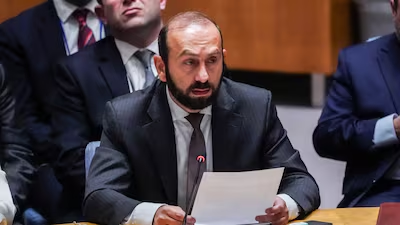
Armenia's Foreign Minister Ararat Mirzoyan addresses the UN Security Council meeting on September 21. AP
Armenia's Foreign Minister Ararat Mirzoyan addresses the UN Security Council meeting on September 21. AP
Armenia calls on Security Council to send UN mission to Nagorno-Karabakh
Armenia and Azerbaijan have been in a long-standing dispute over Nagorno-Karabakh since the Soviet Union's collapse.
